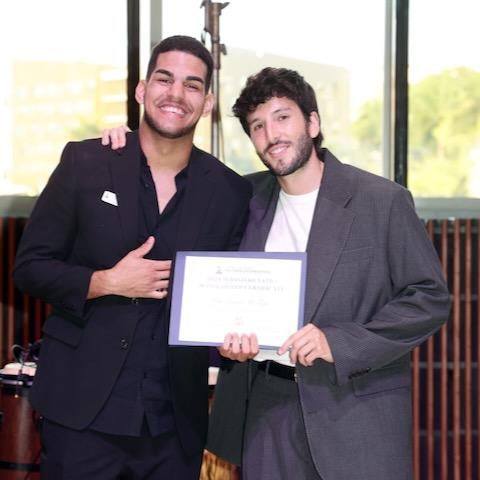A&R in the Digital Age

A&M/Octone Records CEO James Diener gave the 2011 James G. Zafris Distinguished Lecture
Phil Farnsworth
At Berklee’s 18th annual James G. Zafris Distinguished Lecture in February, James Diener, the CEO and president of A&M/Octone Records, offered insight into the changing role of music companies in today’s business environment. In a presentation that kept listeners glued to their seats, he stressed the continued importance of A&R and artist development and candidly discussed how technology continues to test the music industry.
A&R and artist development will always be the lifeblood of the industry Diener said. And it has become more vital than ever in the digital age. There always needs to be a balance between art and commerce, and each genre requires a different perspective on what an artist needs to achieve success.
At the same time, Diener stated that technological advancements have enabled greater connections between artists and their fans. These [developments] have lowered the barriers for musicians, allowing them to enter the marketplace on their own terms, without a gatekeeper, Diener said.
However, since long-term dedication and development are necessary for artists to break through the noise and reach their full potential, labels often shift their focus to superstar acts that are guaranteed to provide cash flow. With shrinking budgets and declining sales in all areas, the 20 percent of acts that break even or make a profit no longer generate enough revenue to support the remaining 80 percent of artists signed to a label. With the risk-to-reward ratio for artist development out of balance, labels are financially forced to crank out that next superstar act and are thus unable to focus on the “long tail.” (The long-tail approach to sales realizes profit by selling smaller numbers of hard-to-find items to many people as opposed to selling larger numbers of a few popular items.)
Diener noted that while it’s easy to criticize labels based solely on this kind of information, many of today’s popular artists rose to prominence under the 80/20 business model. Do-it-yourself vehicles have enabled artists to take hold of their own careers. But in order for artists to break into the international marketplace and reach critical mass, they still need the resources of a multinational organization behind them.
With all the new ways for artists to be easily accessible, Diener said, the mystique of an act can often be lost. Celebrities are everywhere, but for artistry to exist and thrive, artists need to know when to leave the spotlight and trust that people won’t forget about them.
Now more than ever, Diener emphasized that artists should develop a marketing sensibility as well as a music sensibility. All companies favor the most resourceful as well as the most talented. He stressed that everyone gets only one chance to make a first impression, so before an artist decides to take that step either by signing with a label or by entering the marketplace, he or she must be prepared. Before they arrive, artists should do significant research on the company to which they are pitching.
In the past, developments like MTV and CDs have been the saviors of the music industry. However, Diener said that today there is no silver bullet for the industry.
Diener left the musicians in the audience with the inspiring thought that this is a once-in-a-career moment. How best to change the industry is yet to be determined. With all this turbulence and opportunity, A&R and artist development are needed now more than ever.
Kerry Fee and Mia Verdorn are Berklee Music Business/Management department majors.




